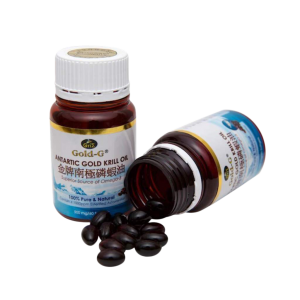Cardiovascular disease is the number one cause of death in the world.
According to a report from the World Health Organization (WHO) in 2018, Ischemic heart disease and stroke are the world’s two biggest killers and also, the main leading causes of death globally in the last 15 years. It is stated that both ischemic heart disease and stroke have caused a total of 15.2 million deaths from 2000 to 2016.
Cardiovascular disease is usually caused by the build-up of fatty deposits on the inner walls of blood vessels that supply blood to the heart or brain. As the fatty deposits getting larger, it will become a blockage that prevents the blood from flowing to the heart or brain.
Nevertheless, cardiovascular disease actually can be prevented. There are many scientific studies have revealed that moderate intake of Omega 3 fatty acids can promote better fat metabolism, effectively control blood lipid and triglycerides levels, and reduce the risk of getting cardiovascular disease.
In 2017, Global Organization of EPA DHA Omega-3’s (GOED) has shared the recommended daily intake of omega-3 fatty acids. A healthy person should consume 500 mg of omega-3 fatty acids daily to reduce the risk of coronary heart disease, while for people who has health conditions such as high blood pressure or high blood lipids, more than 1g / day are required to improve their health conditions.
In addition, the research department of Danbury Hospital has conducted a clinical trial to evaluate the effects of krill oil supplementation on cardiovascular health benefits. 48 participants were recruited and supplemented with either 1 g of krill oil or olive oil on a daily basis for four weeks. The results showed that krill oil supplementation significantly improved endothelial function, increased serum HDL levels, and reduced the risk of cardiovascular disease.
Krill oil is indeed one of the best choices among other omega-3 supplements.
It not just purely contains omega-3 fatty acids in phospholipid form, but it also contains a natural antioxidant called astaxanthin that enhances our cardiovascular health more than other kinds of omega-3 supplements.
Why is omega-3 fatty acids in phospholipid form better? Because phospholipids are the primary structures of human cell membranes. Therefore, omega-3 fatty acids in phospholipid form could be more effectively absorbed into the body and utilized by our body cells.
Moreover, Astaxanthin from the krill oil is actually a powerful antioxidant. It could reduce the risk of cardiovascular disease because it is a great active ingredient that could improve oxidative stress, inflammation, lipid metabolism, and glucose metabolism.

GNE Gold Krill Oil
GNE Gold Krill Oil is an excellent krill oil supplement!
Each 500 mg krill oil softgel contains 140 mg of omega-3 fatty acids, 210 mg of phospholipids, and up to 1000 parts per million of astaxanthin!
GNE Gold Krill Oil is manufactured by the factory which is certified by Good Manufacturing Practices certification, Food Safety System certification, and Hazard Analysis and Critical Control Point certification.
Besides, the factory has obtained the Friend of the Sea certification and registered as a member of the Global Organization of EPA DHA Omega-3s (GOED). The factory also holds a unique patent for the krill oil extraction technology!
Click the link below for direct purchase.
References:
- https://www.who.int/news-room/fact-sheets/detail/the-top-10-causes-of-death
- https://www.who.int/data/gho/data/themes/topics/causes-of-death/GHO/causes-of-death
- https://www.who.int/zh/news-room/fact-sheets/detail/cardiovascular-diseases-(cvds)
- https://www.goedomega3.com/intake-recommendations
- Mohebi-Nejad, A., & Bikdeli, B. (2014). Omega-3 supplements and cardiovascular diseases. Tanaffos, 13(1), 6–14. https://www.ncbi.nlm.nih.gov/pmc/articles/PMC4153275/#CIT0030
- APA Investigators, Gissi-Prevenzione Dietary Supplementation With n-3 Polyunsaturated Fatty Acids and Vitamin E After Myocardial Infarction: Results of the Gissi-Prevenzione Trial, Journal of Cardiopulmonary Rehabilitation: March-April 2000 – Volume 20 – Issue 2 – p 131 https://www.thelancet.com/journals/lancet/article/PIIS0140-6736(99)07072-5/fulltext
- Lobraico JM, DiLello LC, Butler AD, et al. Effects of krill oil on endothelial function and other cardiovascular risk factors in participants with type 2 diabetes, a randomized controlled trial. BMJ Open Diabetes Research and Care 2015;3:e000107. doi: 10.1136/bmjdrc-2015-000107 https://drc.bmj.com/content/3/1/e000107
- Kishimoto, Y., Yoshida, H., & Kondo, K. (2016). Potential Anti-Atherosclerotic Properties of Astaxanthin. Marine drugs, 14(2), 35. https://doi.org/10.3390/md14020035 https://www.ncbi.nlm.nih.gov/pmc/articles/PMC4771988/
- Sati A and Bhatt P: Krill oil: The most powerful omega 3 known on Earth. Int J Pharm Sci Res 2018; 9(7): 2693-99. doi: 10.13040/IJPSR. 0975-8232.9(7).2693-99. https://ijpsr.com/bft-article/krill-oil-the-most-powerful-omega-3-known-on-earth/?view=fulltext
This website does not provide medical advice. The content of this website, such as graphics, images, text and all other materials, is provided for reference and educational purposes only. The content is not meant to be complete or exhaustive or to apply to any specific individual’s medical condition. Always seek the advice of your doctor or other qualified health provider regarding a medical condition.




